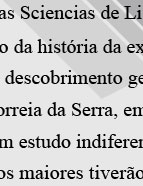

................................
As already implied, the “Annales” passed through several generations. The first, as already seen, that of Bloch and Febvre, was committed to producing an economic, social, and civilisational history in pursuit of a total history. The second, that of Braudel, added geo-history and demographic history. The third, the new history generation, was no longer totalising but rather interested in opening previously unknown or less considered frontiers, namely those of the history of mentalities, historical anthropology and sociology, and psychological history. In Portugal, inspired by Vitorino Magalhães Godinho, studies within the scope of historical sociology were undertaken. These studies were closer to the political field, focusing on themes such as the elections, the caciquism phenomenon, the organisation of parliaments, the constitution and evolution of political parties, and the reproduction mechanisms of political elites.
The assessment to be made also had consequences in the field of political history. The variant took on a new function as the historian ceased to provide arguments to the nation or to power, ceased to feed its need for retrospective legitimation to instead provide the means to better understand and manage social reality. The scientific knowledge of social mechanisms should allow for the development of technical solutions not justify political choices. Understood in such manner, the political would not foster penetration into the core of historical reality, as the ideological discourse made political history incompatible with any scientific status.
In the case of Portugal, much of what was produced during the first half of the 20th century was political and military history. A factual, descriptive approach closely tied to the document was adopted. Historicism still prevailed. In terms of assessment, from the mid-1800s until around 1960, there was a predominance of political, military, and institutional history. With different thematic and chronological approaches and varying literary value, the contributions of Damião Peres (1889–1976), coordinator of the famous so-called História de Portugal of Barcelos, Paulo Merêa (1889–1977), a leading name in the history of law, and João Ameal (1902–1982), politically engaged with Salazarism, are worthy of mention.
